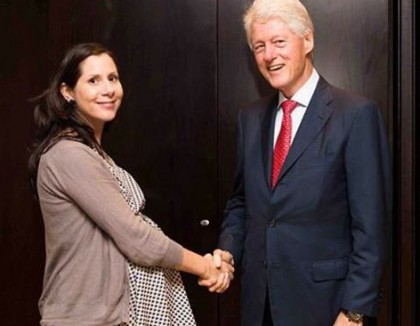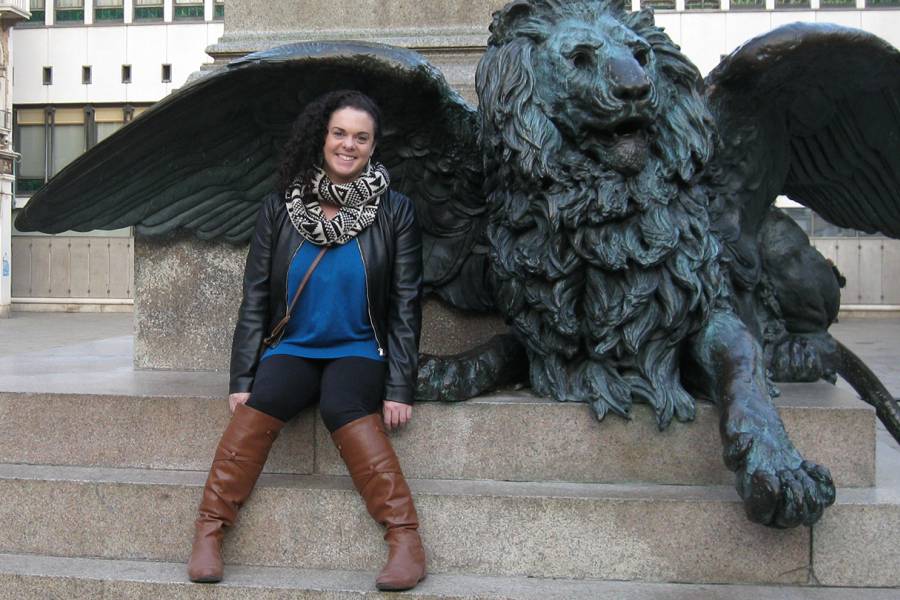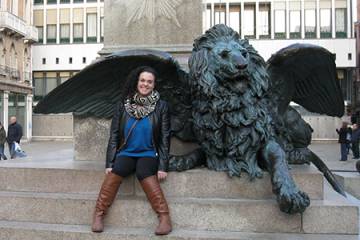September 2013: Elif Yavuz, SAIS '04 (MA), and her partner, Ross Langdon, were shopping at the Westgate Mall in Nairobi, Kenya, when al-Shabbab militants attacked the building. The couple—mere weeks from becoming parents for the first time—were among the more than 60 people killed during the militants' 80-hour siege.
April 2016: Hasan Al-A'raj, founder of the Hama Health Directorate in Syria and believed to be the last surviving cardiologist in the rebel-controlled territories, had finished rounds in the cave hospital he built to protect patients and health workers from airstrikes. As he began driving away from the hospital, a missile hit his van, killing him.
Connecting these tragedies is Kathleen Fallon, a former colleague of Al-A'raj's and the current recipient of the Elif Nazmiye Yavuz Fellowship at Johns Hopkins SAIS. The fellowship was endowed by gifts from nearly 100 people—including from Yavuz's fellow SAIS alumni and matching funds from Bob Hildreth, SAIS '75 (MA)—and supports a student with career and research interests similar to Yavuz's: humanitarian assistance and public health in the developing world.

Image caption: In condolences to her family, former U.S. President Bill Clinton called Elif Yavuz, who worked for the Clinton Foundation in Tanzania, a "brilliant, dedicated" researcher
Image credit: Facebook
"We constantly hear about wars, conflicts, and health crises, and Elif's legacy will carry on in the work of others who are helping in those situations. These fellowships will help those people be ready for that work," says Julie Hackett, SAIS '04 (MA), who helped raise funds for the fellowship alongside fellow alums Camilo Tellez, SAIS '05 (MA), and Alexandra Jaeckh, SAIS '04 (MA).
Fallon has been active in human rights advocacy since she was a high school student learning about the genocide in the Darfur region of Sudan. After graduating from George Washington University, she worked with genocide survivors in Rwanda and Iraqi refugees in Syria. When the Syrian crisis escalated, she shifted her focus to Syrian medical personnel and rescue workers.
"Within Syria, more than any other sector, medics and health personnel are aggressively and systematically targeted by the government," Fallon explains. "Since the beginning of the revolution, and the then peaceful protests, more than 800 medical personnel have been killed in Syria."
She met Al-A'raj through her work as an advocacy manager with the Syrian American Medical Society Foundation and says his death was a turning point in her career path. She later co-authored a report for a human rights organization, the Syria Campaign, titled "Saving Lives Underground: A Case for Underground Hospitals," which the team dedicated to Al-A'raj. In the process, she realized that innovative local projects—like Al-A'raj's cave hospital—could have the biggest impact on the people she wished to serve.
Although Fallon's experience and research have given her an appreciation for the importance of policy and advocacy, she believes the most effective work is happening at the operational level. "For that," she says, "I needed more technical knowledge and a background in public health from SAIS and the Bloomberg School of Public Health."
Fallon is exactly the kind of student Hackett and her classmates had in mind when they came up with the idea to create a fellowship in Yavuz's name after her SAIS memorial service. Hildreth, a former member of the SAIS board of advisors, pledged a $25,000 match gift to help achieve the initial fundraising goal of $50,000. When donors met that challenge, Hildreth pledged a second $25,000 to help the fellowship fund reach $100,000.
"We wanted to fund this in a way that would bring together as many people in [Yavuz's] class as possible," Hildreth says. "This was a cause driven, really, by her classmates."
"Our Bologna class was so close, and we've stayed really close," Hackett says. "[The fellowship drive] was a product of our community and our love for Elif, and maybe a bit of the helplessness we felt of 'what can we do?' after such a tragedy. This was a great way to memorialize her."
"By receiving the fellowship and learning more about Elif and the work she was doing, I feel quite connected to her goals and the importance she placed on international relations and public health," says Fallon, who plans to return to supporting humanitarian and stabilization efforts in Syria after she completes her Hopkins degrees. "It's humbling to have a fellowship in her name."
Posted in University News, Alumni
Tagged alumni, rising to the challenge, giving









